Into the double dip with a cup of Earl Grey
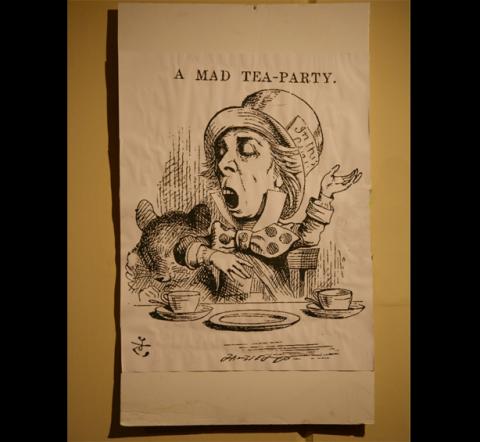
The Mad Hatter's tea party is in full swing in the Department of Finance. By Michael Taft.
The domestic economy is headed into a double-dip recession according to the ESRI. And that’s just the beginning of the bad news. Government ministers and certain commentators will put it down to the Eurozone crisis (“We’re doing a good job, hitting our targets, it’s those darned Greeks, and Italians and Germans”) but the fact is we are lumbering under a sustained level of deflation induced by failed austerity policies. And entering into a period of uncertainty the Government is determined to hammer the economy again. That it doesn’t know the economic impact of its own policies just shows that the whole thing is approximating the Mad Hatter’s tea party.
First, the bad news. GDP is expected to rise by less than 1% next year with GNP falling by 0.3%.
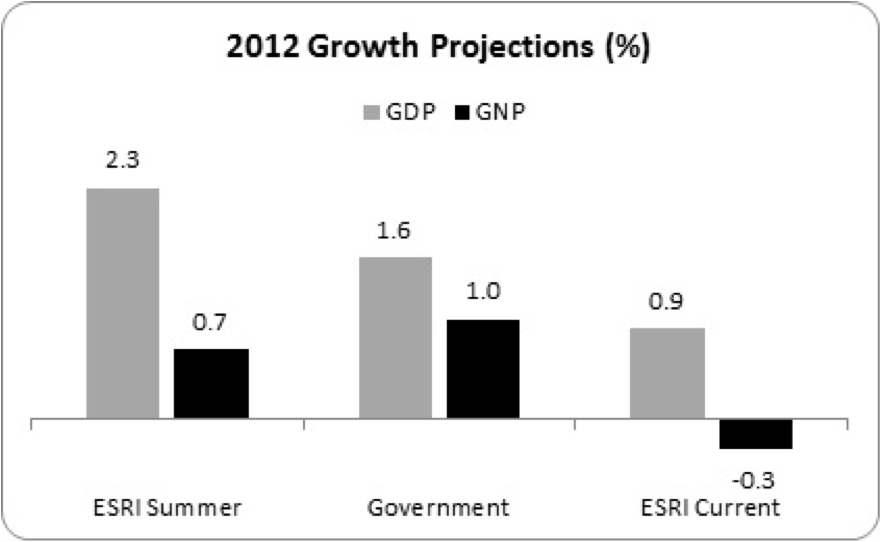
Back in the summer, the ESRI was projecting GDP growth of over 2%. Now they estimate the overall economy will grow by less than 1%, with the domestic economy falling back into recession.
Second, the curious news. The ESRI is projecting GDP to grow this year by 2.2%. This compares to the Government’s own projection of 1%. Looking at this from the outside, this would seem a reasonably positive outcome. Even the domestic economy is projected to grow by 1.2%. However, this hides the fact that the economy is contracting in euros and cents.
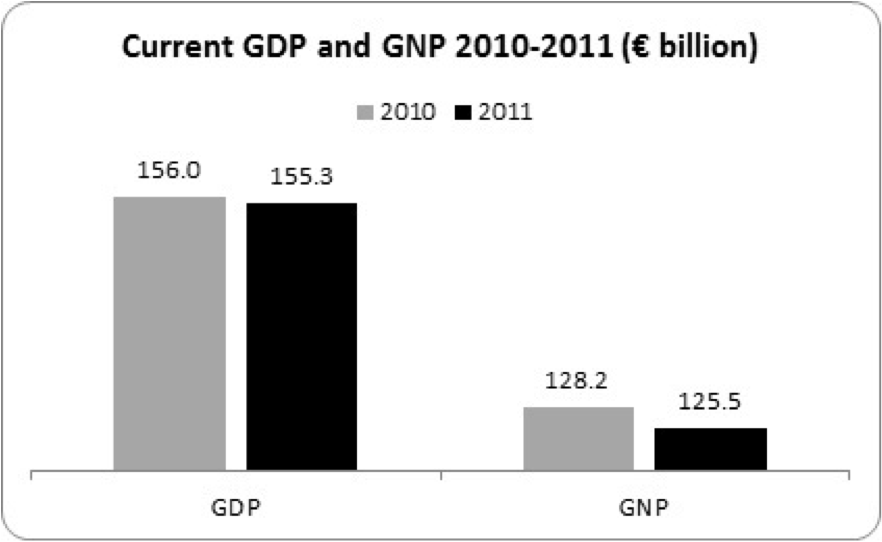
So we have economic growth and the value of our economy falls.
- GDP grows by 2.2% but falls by €700 million
- GNP grows by 1.2% but falls by €2,700 million
The reason for these contradictory results is that the economy is lumbering under an immense amount of deflation and falling prices (asset prices, goods and services prices). This has been engineered by the past Government through its deflationary budgetary policies. We have volume growth but in terms of money per capita, we’re all getting poorer.
Third, and now for the really grim news. There will be fewer people at work in the economy next year than this year. As a result, unemployment will rise - and if emigration is not maintained, it will rise even higher.
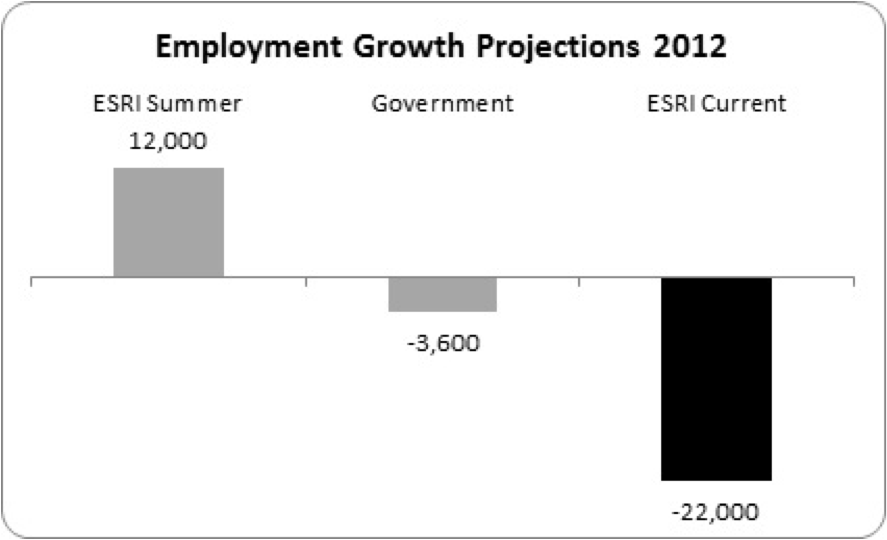
Back in the summer, the ESRI estimated that employment would grow by 12,000. The Government only a few weeks ago conceded that employment would fall marginally, by -3,600. Now the ESRI is predicting that there will be 22,000 fewer people at work next year.
This will lead to higher unemployment. The ESRI is actually projecting an increase in unemployment next year - to 14.5 percent, whereas the Government is estimating it will fall to 14 percent.
As you can imagine, this will have a number of implications for the economy: lower growth, more downward pressure on wages, falling living standards; and for public finances, lower tax revenue and higher unemployment costs.
But wait for it - there will be spin. The poor outcome for next year will be blamed on ‘others’. Oh, if only those ‘others’ could get their act together, our economy would prosper, or at least avoid all this downside.
Yes, the Irish economy will take a hit from the downward momentum in the Eurozone, which both the EU Commission and the OECD claim is looking into a double-dip. But this can only explain part of our souring fortunes.
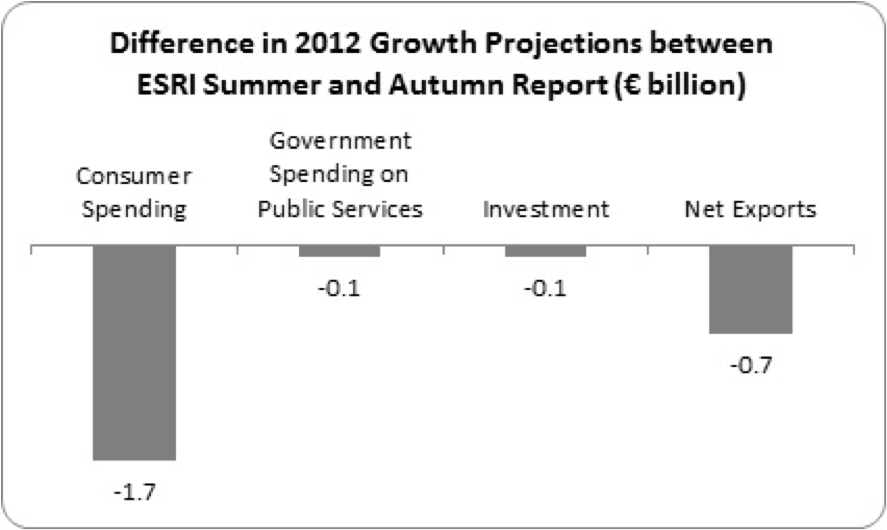
In the summer, the ESRI was optimistically projecting GDP growth of 2.3%; now they’re pessimistically projecting 0.9%. Is this because of falling exports, owing to the eurozone crisis? Only partially. The main reason for the lower growth projections is falling consumer demand, which makes up two-thirds of the difference between the optimistic and the pessimistic growth forecasts.
Falling consumer demand is being driven by falling employment levels, as we saw above. It’s also being driven by the fall in total wages in the economy - a fall of €1.6 billion between the optimistic and pessimistic projections.
This raises the issue: what is the Government actually thinking? If we are entering into a period of declining exports, the last thing we need is a set of budgetary policies that consciously depresses domestic activity - employment, demand, and investment. But that’s exactly what the Government is planning. It may have little control over external demand (the amount of demand for our goods and services in the international marketplace) but it does have more control over domestic demand. And, yet, the Government is intent on driving that downwards.
What makes this all so much more bizarre is that the Government doesn’t even know the impact of its policies. The Minister for Finance has already said he doesn’t know the economic impact of increasing VAT. Does he know the impact of cutting public sector employment? Social protection payments? Cuts in investment? Public service cuts? Probably not, at least on the evidence available to us.
This is highly risky and highly reckless. In fact, if you think about it long enough it’ll wreck your head.
So take a break from it for a while. Get yourself a nice cup of Earl Grey. The Mad Hatter’s tea party is in full swing. {jathumbnailoff}
Image top: Laughing Squid.
